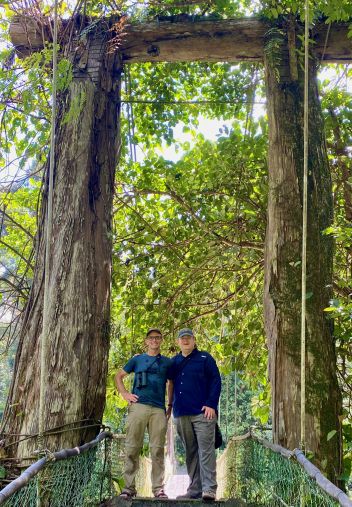
Mark Needham, professor in the department of forest ecosystems and society, was one of the program leaders in our faculty-led summer trip to Borneo. Oil Palms and Orangutans: Forest Conservation in Malaysian Borneo introduced students to the major conservation challenges facing Borneo while traveling around the Malaysian state of Sabah.
How long were you in Borneo? Was all the time devoted to the program or did you do some other sightseeing while you were there?
The program lasted two weeks in June 2022. All of my time was devoted to the program and I did minimal extra sightseeing. There were 17 undergraduate and graduate students from various programs across campus (e.g., natural resources; fish and wildlife; tourism, recreation, and adventure leadership). This course focused on intersections among forest management, wildlife conservation, ecotourism, community well-being, and poverty alleviation. The students observed many animal species (e.g., orangutans, sun bears, pygmy elephants), engaged with local communities and organizations (e.g., palm oil plantation companies, community-based ecotourism enterprises, government agencies, non-governmental organizations), engaged in various experiences (e.g., tree planting, cooking local foods, playing local music), and participated in daily discussions and debates as well as working on their assignments. Through this immersive and experience-based learning opportunity, the students gained a wide understanding and appreciation for these issues and the local cultures. It also broadened their perspectives on various topics.
What is one memory from the program that sticks out?
Seeing my first orangutans and first sun bears in the wild; the variety and diversity of wildlife species in Borneo are incredible! I will also never forget how thoughtful, engaged, and kind all of the students were. This was the first multi-week study abroad course that I led and it impacted me more than I ever imagined. I was energized by the student enthusiasm and passion. I was encouraged by the student thoughtfulness and appreciation for the complexity of the issues discussed. And, I was touched by the student compassion and caring for their fellow students and the local community members.
What advice do you have for students interested in this program?
Just do it! Step out of your comfort zone and go for it! Traveling internationally in developing regions and with a class group can be difficult and challenge you in various ways, but the experiences, relationships, and knowledge gained are priceless, and you will never forget it.
I know you love photography, how many pictures did you take in Borneo?
Yes, I am a professional wildlife photographer. I took more than 2,000 images of wildlife in Borneo. I am only now just starting to sort through and process (i.e., digitally develop) some of them, as right after Borneo, I traveled straight to South Africa, then Botswana, then New Zealand, and then Australia, so this summer has been a whirlwind of amazing places and adventures!
Anything else you would like to share?
At the end of the course, many of the students said things such as “this trip changed my life,” “it solidified my choice to study natural resources and all of the complexities associated with managing these resources and the people who depend on them,” and “I now want to study these issues in much more depth, perhaps by continuing on with a graduate degree.” This feedback is awesome and so gratifying!
Our faculty led programs offer students the opportunity to study special topics for academic credit with College of Forestry faculty. These programs are both led and conceived by our faculty, and may incorporate study with international students and instructors. They are often shorter than the length of a term and may take place during spring break, winter break, or the first or last few weeks of summer term.


Very well done and most interesting read , Looking forward to next post.